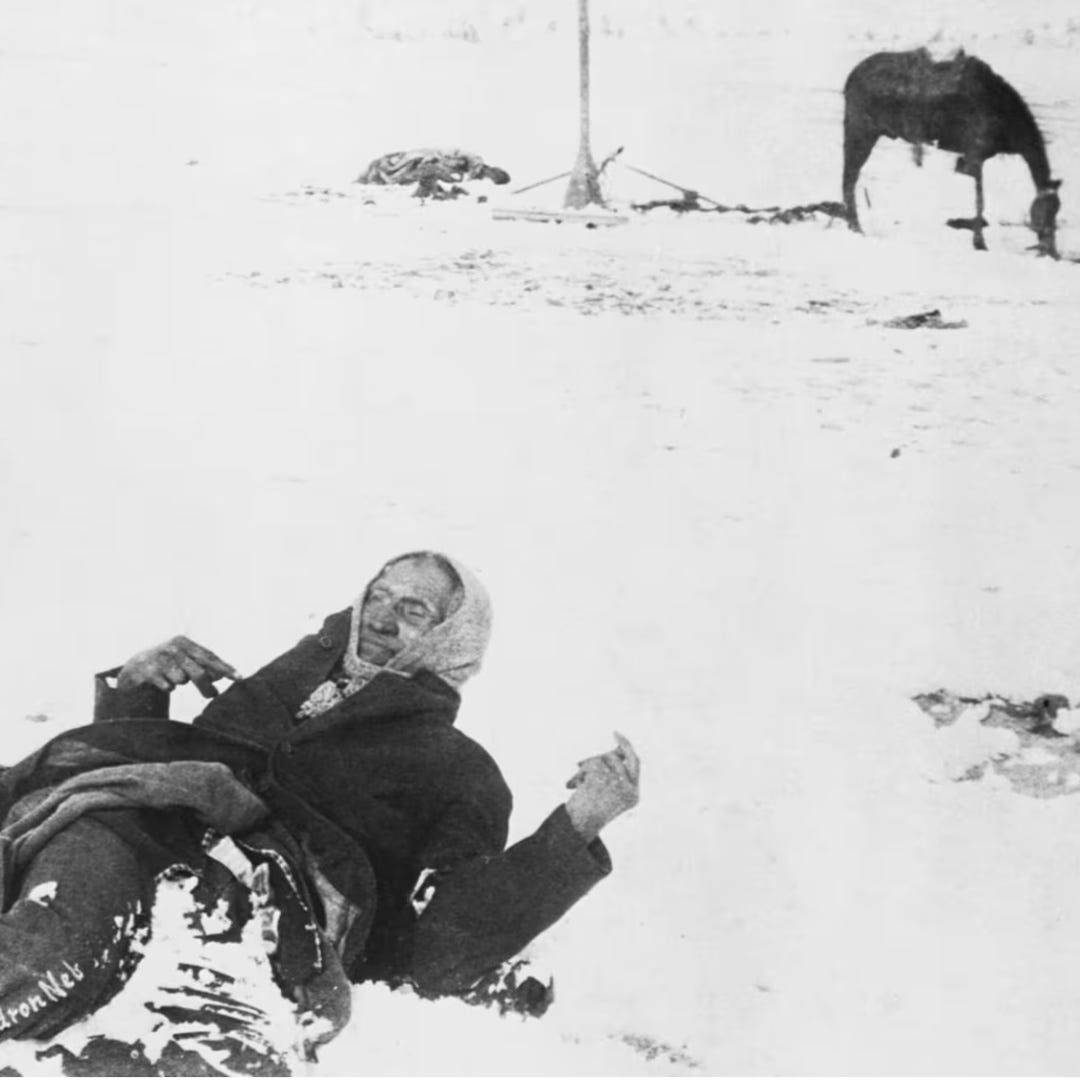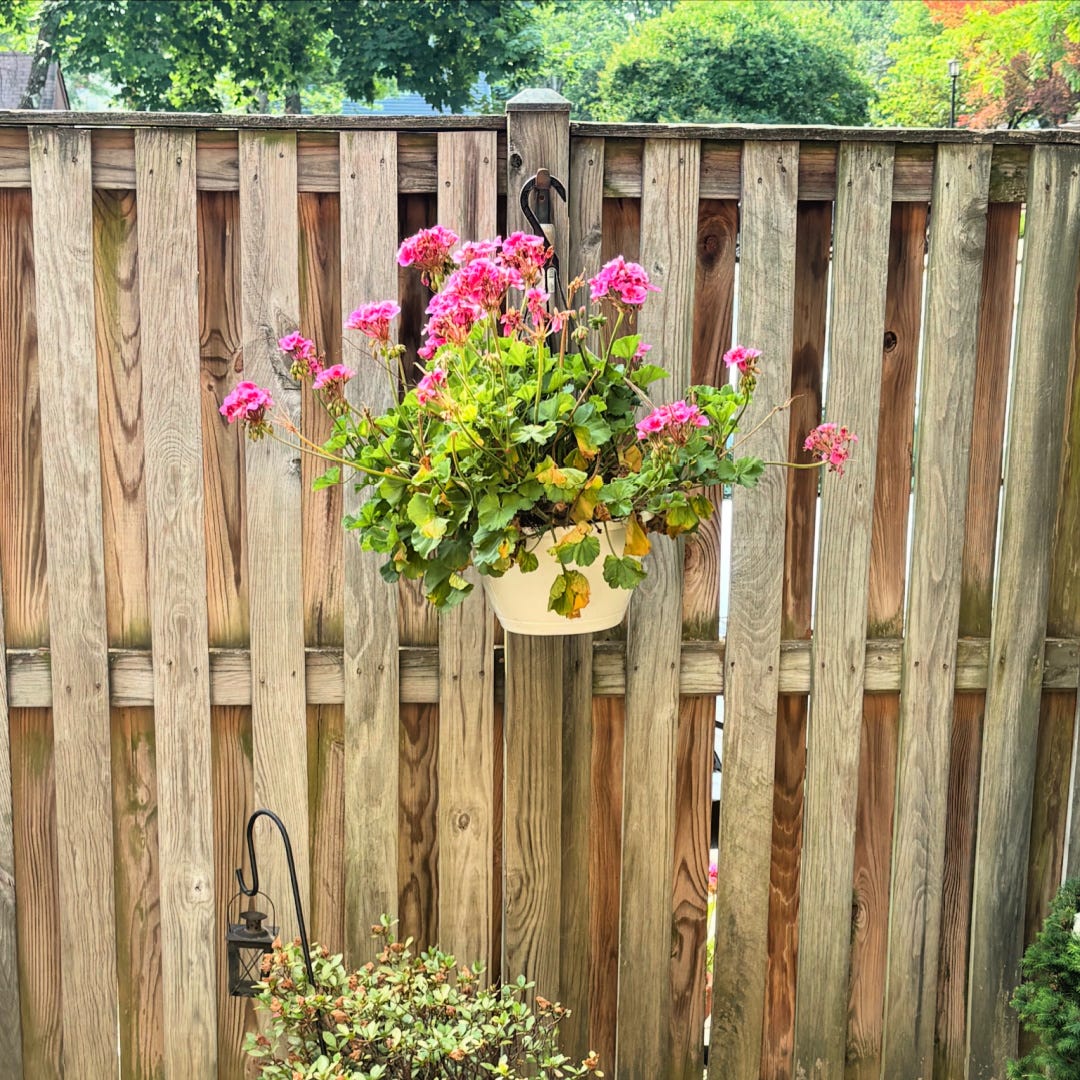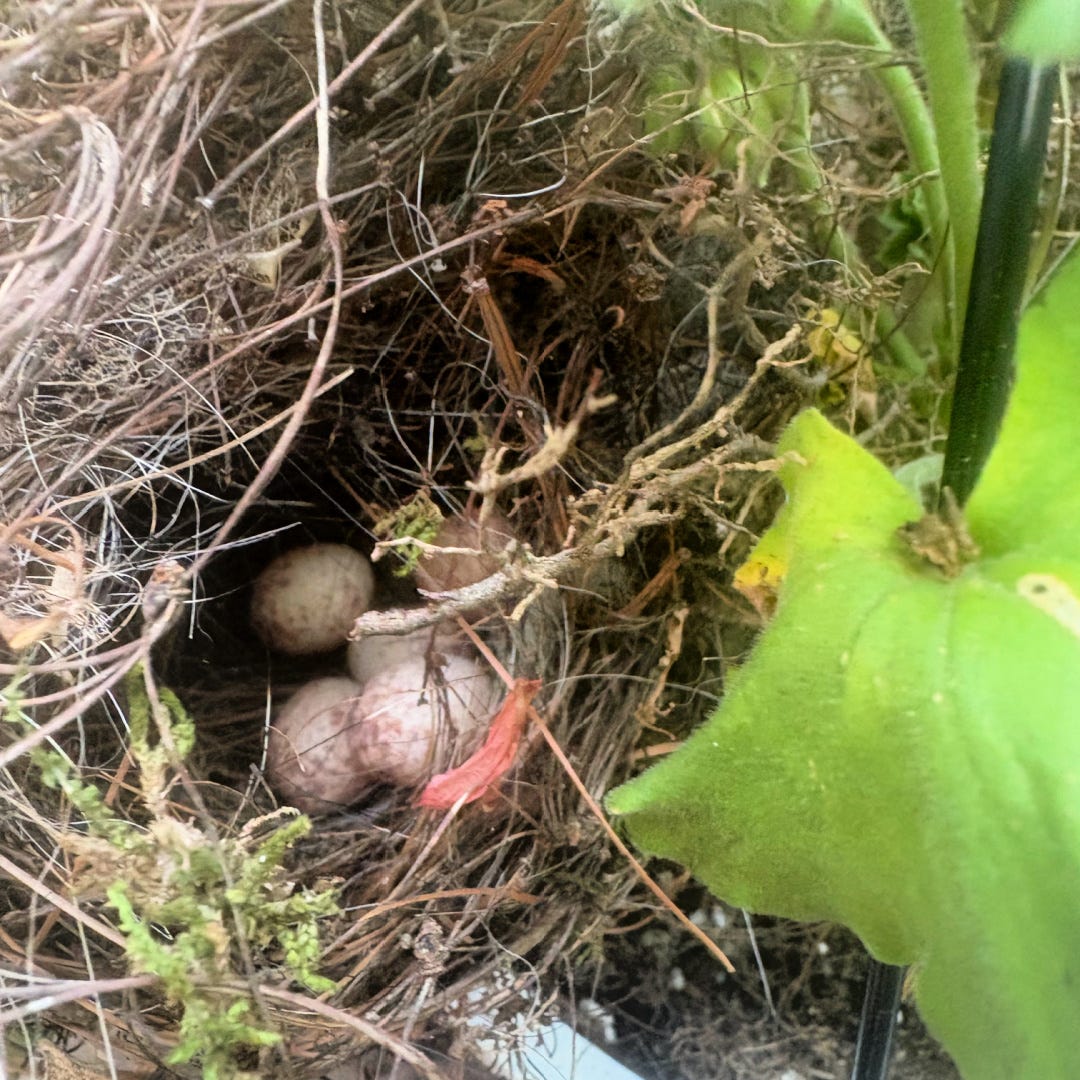Neighbors, I’m not entirely sure where I’m going with this note, so just know that from the outset. Also, this is a bit early this month, because I’ll be busy on the last Monday of this month.
On June 6th, I glanced out the sliding glass door in my kitchen and noticed a Carolina Wren hop along the fence with a bit of moss in their mouth and then nestle down into this geranium where it was building a nest. I was so happy that this bird relative wanted to come live in my geranium and raise their babies there in a little grass and moss-lined hollow in the dirt beneath the pink petals. My mind immediately replayed the very deep sound of my Apsáalooke grandfather’s voice saying, “Pay attention to what the birds have to say, Angela.”
Noticing Joy
I felt a tiny surge of joy. What did this wren need to tell me? Maybe it was just that? To not miss the joy. So, I took a quick picture and posted it to Instagram. Just a short, simple documentation of joy before it slipped by unnoticed. Joy is hard to come by these days and always laced with foreboding. It felt important to acknowledge that our bird relative told me to let it in. It felt important to be dutiful to my grandfather’s teaching.
For the next eight days, I watched every chance I got for a glimpse of a wren in the geranium. I was hoping to be fast enough to catch on video the busy coming and going of the nest builders. But I didn’t see them again.
On June 13th, I got home from walking the dog in the morning and decided to get busy myself, watering and tending to our outdoor plants. The geranium was beginning to die, and since I knew that sometimes wrens build “practice nests” that they don’t actually use, I thought I should try to clean up their attempt and salvage the geranium.
The Nest
I took down the hanging basket, pulled dead blooms off, plucked off a few yellowed, wilted leaves, and began to pull the nest out of the stems where it had been knitted so snuggly. And that is when I saw them . . . five tiny, pale cream eggs with sandy brown splotches resting in a lovingly crafted grass womb. I gasped out loud, trying to carefully place the nest back in the shallow hole the wrens had made in the geranium’s soil. I quickly rehung the geranium and ran inside crying.
I stood in the kitchen looking at the pot swaying on the hook screwed to our courtyard fence. The wren appeared. The first time I’d seen them in eight days. They fluttered from the fence to the arm of a patio chair and then up to the geranium. They inspected things, going back and forth, from an overview position perched on a geranium stem, to an up-close position right on the lip of the nest. I couldn't believe the mistake I’d made and was terrified that my bird relative would now abandon the nest I’d disturbed.
My husband walked into the kitchen, asked me what was wrong, and through sobs, I told him what I had done. “There is so much death. They are killing babies everywhere. I just don’t want to be among the killers.”
Inconsolable
He tried to comfort me, but I was not consolable. Witnessing genocide has completely changed how I see the world.
What was done to the indigenous people of this land now feels more visceral than ever for me . . . the way we renamed things to erase them, the way we corralled them into “reservations,” essentially mini-Gazas, everywhere. Real estate listings give me a stomachache. We buy and sell land that isn’t ours, just like Israeli developers holding Palestinian land sales inside synagogues.
I read an account last winter from a Palestinian describing the blood frozen on the ground around people who had been killed, and it reminded me of this photo, which I came across while researching the life of Heȟáka Sápa (Black Elk). At Wounded Knee, the US Army massacred over 300 Lakota people, including women, children, and the elderly. Then there was a three-day blizzard. When they came back with civilians, who were being paid to bury the dead, the bodies, like this elderly chief, were frozen.

Since we were forced over the weekend to repeat the same 2003-era “weapons of mass destruction” justification for war in the Middle East, let me not hesitate to mention the genocide perpetrated by the U.S. against the Iraqi people, which cost millions of lives. How many Iranian lives will be enough to satisfy the war profiteers? And, if we face the results of these horrifying lies, then maybe we should also consider the way the imperial boomerang has come back home from our evil conquests in the Middle East, with masked, militarized ICE agents now kidnapping men, women, and children off our streets. Isn’t the violent separation of families also a form of genocide? I haven’t even mentioned ecocide yet.
My recognition of genocide and constant connections across time and context now also extends across species. About seven or eight months ago, my daughter, who has always been very sensitive about our animal relatives, called me crying. She had seen the body of a dead fox on the freeway off-ramp and couldn’t shake how sad it made her. “I know, Honey. I know. I see it now, too. This is ongoing genocide.”
Performing Wellness
All of this and more is why I couldn’t stop crying about the nest. You might think, “Welp, the joy sure took a turn toward another depressing note from Angie. She is traumatized.”
And I am traumatized. I think it is supremacy culture, colonizer culture, to think we should witness, or even know, about any of this and not be traumatized. It is a make-believe and harmful expectation that we would be “well” in this moment.
When I came here, almost three years ago now, to write about community care, one of the things I wanted to challenge was the way we are asked to perform health and wellness in our ill society, something I often observed in my former coaching work. My friend at Consider The Birds shared a quote by Francis Weller a few days ago that sums it up: “Grief is subversive, undermining our society’s quiet agreement that we will behave and be in control of our emotions.”
A Womb In The Dirt
If you’re grieving and changed by this, you are not unwell; you are human. Moreover, when you make these connections across time, contexts, and species, you are not only human, but you are also having an intensely spiritual experience.
I don’t mean that in a new-agey, privileged bypassing, “the suffering of others is my mystical encounter” way. I mean it in a God, or however you conceive of the thing bigger than us, is with the hurt, and the harmed, and the crushed. God is with us in the absurdly whimsical joy of a mousy brown Carolina Wren building a nest under the pink blossoms of a potted geranium. But God is also with us in the gasping sorrow of extinguished life.
Later that day, as I was driving to my daughter’s house to spend time with her and my baby grandson, I started getting tearful again thinking about how precious my grandson is and how his arrival has only increased how fierce I believe we should be about defending the future of all life, and how sorrowful I was that I might have harmed the future of the wren’s babies, I thought back to something my friends at
shared on their Instagram account at the end of May:“God is not a patriarch in the clouds, but a womb in the dirt.”
God is a woven grass womb in potting soil. God is mothers and grandmothers, sobbing inconsolably in unswept kitchens, wondering just how loudly they will need to scream to save the literal fruits of their labor. God is all of us who understand the incalculable value of each living thing and grieve on our knees on dusty brick patios, pleading for even one life, a butterfly, a wren, an Iranian child, to be spared amid so much killing by the greedy and power-hungry.
The birds say many things, Neighbors. They speak about joy and loss. Nobody calls them unwell for mentioning them both in the same song. Pay attention.
What joys have you noted recently? Do you feel pressured to perform wellness? Can you connect to anything spiritual in this moment, or does it feel distant?
Neighbors, if this monthly note is meaningful, but you aren’t into subscriptions, you can show your support with “Buy Me A Coffee.” Click the button!




Hi Angie, sending you a big hug ❤️. I'm sorry that happened with the nest, I can imagine how you felt. Life feels so fragile right now. I have absolutely been feeling the pressure to perform wellness. Having 2 "children" at home who are older and see everything going on in the world makes mental health a top priority. They are both in tune with everything, and our youngest is overwhelmed. She is having a hard time, and she's just a little too young to take this all on, not enough perspective yet. It's impossible to temper it though. I'm dealing with health issues and that makes it more difficult. But I can't complain too much because I know what so many people are going through right now, and in comparison what I'm dealing with is nothing. There have been plenty of joys, time with family and friends, birthdays celebrated, kids finishing their semesters at school, the list goes on. And onward we go. I am holding out hope for the nest. 💗
Have any of the eggs hatched?